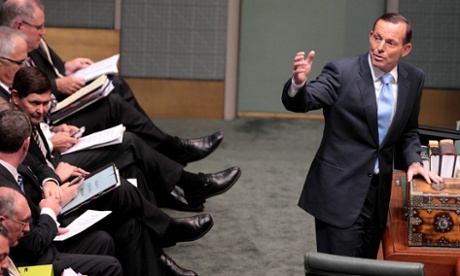PM’s attack comes as AMA president says it is clear $7 charge would deter some people from seeking treatment

Tony Abbott says it is wrong and “untenable” to argue a $7 co-payment will stop some sick people seeing a doctor, but the new president of the Australian Medical Association says it is clear that for some the co-payment will be a deterrent.
Asked during question time to confirm that people suffering chronic diseases would pay the $7 charge for most doctor visits and procedures, the prime minister dismissed the assertion that it would act as a disincentive.
He said it was a “slightly sad attempt by members opposite to say that people are going to be deprived of vital health treatment because of the … modest co-payment on Medicare”.
“How can members opposite seriously say that a modest co-payment for visiting the GP will stop sick people from visiting the doctor when they don’t contend that a modest co-payment for the pharmaceutical benefit scheme is such a disincentive,” Abbott said.
“How can they say that co-payments for Medicare are wrong and co-payments for the PBS are right? They simply cannot sustain the logic of their position. Their position is simply untenable.”
But associate professor Brian Owler, who was elected president of the AMA at the weekend, will meet the health minister, Peter Dutton, on Thursday to argue the co-payment will be a deterrent for some.
Owler, a neurosurgeon at Westmead Children’s Hospital in Sydney, said the co-payment would not be a problem for many people. “But we already know that even before it is introduced there are people who are deferring health care or deferring filling a script because of the cost,” he told Guardian Australia.
“We already have patients asking which script is most important because they can only afford to fill one.
“For some people this co-payment will stop them seeking care, and for many people with chronic diseases who see a doctor regularly and who need tests and procedures, this could act as a deterrent, and the eventual effect of that will be that overall medical costs increase rather than decrease,” he said.
